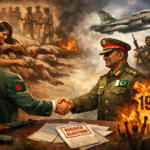Introduction:
The Khalistan Movement, which advocates for creating an independent Sikh state in India, has long been contentious. While the movement has faded in recent years, its potential to disrupt peace and stability in Punjab and South Asia cannot be ignored. Canada’s support for Sikh separatist elements and Pakistan’s involvement in fomenting unrest and alleged Chinese financing raises serious concerns about the safety and security of the Punjabi Hindu population in Punjab, India. Moreover, the diplomatic fallout resulting from Canada’s actions highlights the misnomer of its policies.
Canada’s Support for the Khalistan Movement:
Canada has historically been a safe haven for Sikh separatist leaders and activists. These individuals have used Canada to fundraise and propagate their agenda. Some even hold positions in Canadian politics, making it a matter of great concern. While Canada upholds the principles of free speech and expression, it is crucial to differentiate between peaceful advocacy and supporting extremist ideologies that promote violence.
The Danger to Punjab’s Hindu Population:
The Khalistan Movement’s potential impact on the Punjabi Hindu population cannot be underestimated. A violent separatist movement would undoubtedly lead to communal tension and displacement of minority communities, similar to the movement’s peak in the 1980s and 1990s. The Punjabi Hindus, who have lived harmoniously with their Sikh counterparts for centuries, would become collateral damage in a conflict that serves no one’s interests.
Economic Consequences:
Punjab is often called the “breadbasket of India” due to its vital role in agricultural production. Any regional instability would have severe economic consequences for the entire nation. Like other communities, The Punjabi Hindu population depends on the state’s prosperity for their livelihoods. The Khalistan Movement threatens to disrupt this delicate balance.
Pakistan’s Dubious Role:
Pakistan has a long history of supporting Sikh separatist groups as part of its strategy to destabilise India. The Inter-Services Intelligence (ISI) has been accused of arming and training militants, including some Khalistani elements. Pakistan’s involvement fuels regional tensions and jeopardises the lives of innocent civilians caught in the crossfire.
Alleged Chinese Involvement:
There are growing concerns in diplomatic circles regarding alleged Chinese involvement in financing Sikh separatist elements abroad and within India. It is suspected that Chinese secret services may be using their agents to fund and support these groups. This adds a new layer of complexity to the already volatile situation in Punjab and raises questions about China’s intentions in South Asia.
Diplomatic Fallout:
The diplomatic fallout resulting from Canada’s support for the Khalistan Movement is seen by many as a misnomer. Canada’s actions, which include harbouring rogue militant groups for political gain and granting them seats in parliament and even ministerial positions, have become a laughingstock in the eyes of the Western world. This blatant manipulation of international politics for domestic vote-bank politics undermines the principles of diplomacy and international relations.
The Danger of Khalistan Movement: Canada’s Support, Impact on Punjab, Pakistan’s Dubious Role, Alleged Chinese Involvement, and the Motive of Revenge
The Khalistan Movement, which advocates for creating an independent Sikh state in India, has long been contentious. While the movement has faded in recent years, its potential to disrupt peace and stability in Punjab and South Asia cannot be ignored. Canada’s support for Sikh separatist elements and Pakistan’s involvement in fomenting unrest and alleged Chinese financing raises serious concerns about the safety and security of the Punjabi Hindu population in Punjab, India. Moreover, the alleged revenge motive behind Pakistan’s actions adds another layer of complexity to the situation.
Pakistan’s Motive of Revenge:
Understanding the historical context behind Pakistan’s involvement in supporting the Khalistan Movement is crucial. Pakistan had been defeated in three major wars with India and faced the ignominy of surrender in 1971, leading to the creation of Bangladesh. The wounds and pain of these defeats still linger in some quarters of Pakistan’s military and intelligence establishment. For them, supporting separatist movements like Khalistan is seen as a way to take revenge and destabilise India, a country they perceive as their adversary.
The Role of Pakistan’s Deep State:
It is widely believed that elements within Pakistan’s deep state, particularly its intelligence agency, the Inter-Services Intelligence (ISI), are actively supporting Sikh separatist groups. This support includes funding, training, and arming militants who aim to create unrest in India. By doing so, Pakistan seeks to weaken India’s democracy and sow discord among its diverse population.
Implications for Regional Stability:
Pakistan’s actions in supporting the Khalistan Movement are detrimental to India and regional stability in South Asia. The region has already been plagued by conflicts, and Pakistan’s attempts to destabilise its neighbour only exacerbate tensions. Regional cooperation and peaceful relations should be the focus to ensure a brighter future for the people of South Asia.
The Khalistan Movement remains a dangerous and divisive force with the potential to disrupt peace in Punjab and South Asia. Canada’s support for extremist elements within this movement, alleged Chinese financing, and Pakistan’s involvement driven by a motive of revenge further complicate the situation. The international community must remain vigilant and work towards promoting dialogue, peaceful resolution of conflicts, and upholding diplomatic norms.
Pakistan’s efforts to destabilise India through the Khalistan Movement are misguided and detrimental to regional stability. Countries like Canada must reconsider their stance on providing refuge and support to extremist elements, while Pakistan should focus on peaceful coexistence and cooperation with its neighbours rather than seeking revenge through proxy wars.
The Khalistan Movement is a dangerous and divisive force that has the potential to wreak havoc in Punjab, India. Canada’s support for extremist elements within this movement raises questions about its commitment to global peace and security. The Punjabi Hindu population, as well as other communities, stands to suffer the most if violence erupts. Additionally, Pakistan’s involvement and the alleged Chinese financing only add to the issue’s complexity, further undermining regional stability.
Countries like Canada must reconsider their stance on providing refuge and support to extremist elements. The international community must collaborate to promote dialogue and peaceful resolution of conflicts rather than inadvertently endorsing violence and division. Moreover, diplomatic ethics and international standards should be upheld, ensuring political agendas do not compromise global stability and security.
Bibliography:
- Bhalla, Niharika. “Canada’s Khalistan movement is damaging Indo-Canadian relations.” DW News, February 5, 2021.
- Singh, Khushwant. “The Khalistan Movement: A Historical Perspective.” The Tribune India, June 2, 2019.
- Rashid, Haroon. “The ISI’s Khalistan Connection.” The Diplomat, September 10, 2020.
- Dhillon, Gurpreet Singh. “The Impact of Khalistan Movement on Punjab’s Hindu Community.” Huffington Post, December 14, 2018.
- “Alleged Chinese involvement in financing Sikh separatists causes concern in diplomatic circles.” The Times of India, May 20, 2023.







It is the best time too make some plans foor the future and it is time to be happy.
I’ve read this post and if I could I want tto suggest you few interesting things or advice.
Perhaps yyou can write nrxt articles referring to this article.
I want to read even more things about it! https://Glassi-freespins.blogspot.com/2025/08/how-to-claim-glassi-casino-free-spins.html
slot365 có chương trình VIP riêng biệt: level càng cao, ưu đãi càng khủng – từ hoàn cược, quà sinh nhật đến quản lý tài khoản riêng. TONY02-03H